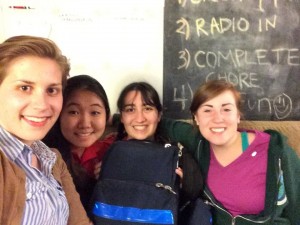By Laura DiTaranti, COL ‘15
There’s a fuzzy noise. I’m not sure why I’m awake. The second time it goes off more clearly: a loud blare with a voice, “Radio to MERT.” I fumble for my radio in the dark and finally I am able to grab it. “Go for MERT,” I reply. As I roll out of my favorite bed in the squad room in the Quad, the radio gives me the details of what I’m to respond to. After I bundle up and grab one of my four response bags (the other three are on my bike), I knock on the door to the other bunk room and rouse my crew. They’re up already, having also heard the radio. We quickly divvy up tasks – I’ll lead, you’ll take vitals, you’ll do the paperwork – and then we’re on our bikes and headed to our patient.
I’ve been an Emergency Medical Technician (EMT) for five years, and I served on both the squad in my hometown and on the Medical Emergency Response Team (MERT) at Penn. I got my EMT license because I wanted a practical way to test my interest in medicine, and I didn’t see any better way than actually having my own patients.
Being an EMT was huge in helping me determine what role I wanted to play in my future health professions career. First, it helped me figure out that I wanted to be around patients. Every patient made me happy – even if it was a patient who wasn’t particularly happy to see me – because I knew that I had made a difference for that patient. I also really like people, so seeing patients was a way for me to apply the science that I loved to human situations. Second, it helped me figure out that I never wanted my scope of practice to be limited; while there was a lot that I could do as an EMT, there was more that I couldn’t do, and that was frustrating.
I gave a lot to Emergency Medical Services (EMS), spending countless hours on shift and more perfecting my skills when I was not on duty. However, I will always attest that EMS gave me more. Leading crews and running calls taught me valuable leadership skills that I use every day, and my most tiring nights taught me resilience. I developed clinical skills and interpersonal skills, and I learned how to juggle academics and service. But, most importantly, EMS gave me a family. You don’t stay up till 5am together without getting pretty close.
For any pre-health student, gaining clinical experience is vital. Not only should it solidify your career choice, but it should also show you that medicine is fundamentally service. Most importantly, though, your clinical experience should make you wildly happy.


